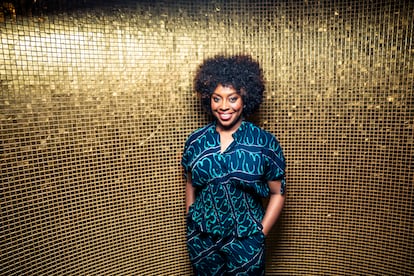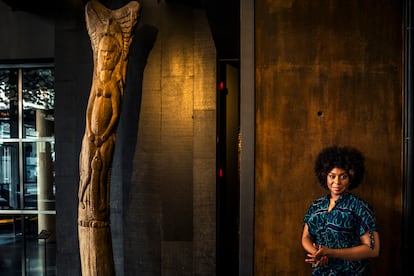Chimamanda Ngozi Adichie (Enugu, Nigeria, 48 years old) arrives at the hotel in the center of Madrid at one in the afternoon and sits smiling at a table in the cafeteria. This very nice woman is a real celebrity in her country. And one of the most recognized novelists in Africa and the United States, her second homeland. In Half yellow sun (2005, Random House) narrated a part of Nigerian history, the Biafran war, with dazzling mastery, and in Americanah (2013, Random House) told the adventures-misadventures of a young African woman in the United States and the adventures-misadventures of the same young African woman returning to Africa after her time in the United States. From this book is her famous phrase: “In the United States I realized that I was black.”
After more than ten years without writing fiction (she is superstitious and does not want to name the word blockade), and after becoming, among other things, a feminist icon, Chimamanda returns with a novel, a few dreams (Random House), which tells the intersecting lives of four African women. He is preparing to answer the first question when the waiter arrives and asks him what he wants. “Well, I don’t know, what do you drink here at this time?” “Well, at one o’clock, beer or vermouth,” they reply. She laughs, letting out a laugh that echoes throughout the cafeteria. “No, no, bring me some pineapple juice. Don’t they drink pineapple juice here?” “Yes, but for breakfast,” they answer again. And he laughs again, with the same contagious laugh.
Ask. First of all, a curiosity: Is it true that you wrote part of this novel in a public library? Did they not recognize her?
Answer. I wrote the first version of the book at home. But for corrections, yes, I went to a Maryland State library. I think they did recognize me, but they left me alone. She was, of course, with a sweatshirt, sunglasses, a little disguised. I carried my bag and my books and my computer and stood in a spot in the corner. I like that place, I like being surrounded by books, I like that there are people who go there to read books. I will also go with the next novel, although I don’t know if I should talk about it, because the other day a woman told me: “I’m going to go there every day, I’m going to wait for you until I see you.” Ha ha ha.
P. This book comes after 10 years of, let’s say, a hiatus. How did you feel without being able to write?
R. I felt unhappy, but the biggest feeling I experienced was fear. Because writing is essential to me, writing fiction, I mean, and thinking that I wouldn’t be able to write more fiction seemed unbearable to me. I was terrified that I would never be able to write again. And I didn’t want to think about it, but I thought about it.
P. She maintains that her mother, who died not long ago, helped her. As?
R. She was very protective. She died unexpectedly, I never thought that my mother could die. It was a little unreal. Even now, when I talk about it, I have a hard time thinking that it really happened. I don’t know what happens when we die, but I think a part of us doesn’t. It is the part of us that dreams, that loves, that does not die. There is something, a force, something human that does not die. And I think that my mother’s strength remains. She knew I had problems with pain and grief and she protectively got me to write again. I have no other way to explain it than how I feel.
P. You say that one of the most touching characters, Kadiatu, your mother would have liked.
R. When she saw a woman who had real problems, she referred to her as “comrade.” It was a way of saying I see you, I recognize you, I know what you are like.
P. The character is inspired by the case of Nafissatou Diallo, the Guinean cleaner who in 2011 accused Dominique Strauss-Kahn of sexual assault in a New York hotel. Why were you inspired by her?
R. I followed the case very closely. Sometimes you see something on the news that you connect with. Maybe it was because that woman came from a West African country, like me. She was a bit my sister. Although I didn’t know English and didn’t have much education. But I felt like she was my sister, I felt like I had to protect her because she lacked what was needed in a situation like that. I kept that story for many years. when I started a few dreams I didn’t plan to include it. But the character revealed itself to me.
P. He assures that it is a way to restore dignity to him through literature.
R. She was pictured without it on the news. We heard about Strauss-Kahn, about the emptiness that loomed in his life, about the things he liked, about the things he was going to lose because of what he had been through. Even though he was the aggressor, we could feel some sympathy towards him. However, she was not treated as a person, especially in American coverage of the story. They even said that she had been used to set a trap. It became an object. And I thought of her as a human being, as a woman who loved her life, who went one morning to do her job and that life changed forever. Thanks to literature I give that woman back her humanity. She has flaws, she is not perfect, but no one is.
P. Why is fiction so important?
R. History tells us what happened to people, fiction tells us what they felt. And it’s important to know that. I speak as a writer and as a reader. I read history, but what remains in me is always the novel about that historical period. I guess it’s because fiction is closer to life. Plus, stories can change you, they can change people.
P. a few dreams portrays four African women. One is a lawyer, another a banker, another a travel writer and the fourth is Kadiatu, who until the day she was sexually assaulted was happy. Do you try to escape the stereotypes that surround African women, such as poverty, hard life, misfortune…?
R. I write about what is familiar to me. We all know that there is poverty in Africa. But it’s much easier for me to write about the middle class. These are the women I know, the ones I grew up with. Furthermore, it is impossible to understand a place like Africa through stereotypes. The stereotype of Africa, from Europe, is that of poverty. There are many poor people in Nigeria, it is true. And there is also a small group of extremely rich people. And the two groups coexist. You can’t understand Nigeria if you don’t see those two parts. Because one shapes and conditions the other. Nigeria has become very materialistic in recent years. And as the gap between rich and poor widened, the country became more and more materialistic. That’s why you see people who have nothing and want to buy a designer bag. From the West, Africa is not seen through social classes. It is observed throughout the tribes. It is said: ‘the president is from such and such a tribe’. But everything is more complicated. Social classes complicate it. People from different tribes come together because they share the same social class. You have to have a broad point of view to understand Nigeria and Africa.
P. You claim that the worst thing about colonialism is that it teaches colonized people to hate what is theirs.
R. That’s terrible. In colonial school they tell you that your father and your grandfather and your great-grandfather and your African great-great-grandfather did horrible and demonic things. And that you are the first to be saved, becoming a Christian, a Westerner and this alters your way of thinking. My father studied mathematics in London, but he was always very sure of himself, of what he was, of being an Igbo man. And he educated us in that. That’s why I have never hated my culture, on the contrary, I have loved it very much. But I know people who don’t. Colonialism doesn’t just take over your land; It also takes over your mind.

P. You have been a fervent defender of feminism, almost an icon. How do you see that fight now? Some claim that we are facing a kind of regression due to the rise of the extreme right in many countries.
R. That regression exists. And part of the problem is that it is not only caused by the extreme right, but by the right itself. There is currently a populism based on the longing for a happy past, for a happy time that, certainly, was neither happy nor happy for women. This regression is exemplified in the United States, where abortion is not legal in many states. A woman should have the autonomy to do what she wants with her body.
P. You have one child through natural birth and two others through surrogacy. A broad current of feminism condemns this system for having children. Don’t you find it contradictory to be a feminist and choose this method to have children?
R. I understand people who condemn this method. I understand your point of view. Surrogacy can become something terrible. But there are different ways to do it. There is a business side that is scary. But it is not always like that. And I wouldn’t want to talk more about that, because it concerns other people’s private lives, and I’m not exactly talking about myself.
P. How do you see Trump’s America?
R. How do I see it? Well wonderful! (Laughs to support the irony and then becomes very serious). The USA is no longer the USA. The president of the country verbally attacks those who do not agree with him, he fires those who do not agree with him, not because he has not done his job, but because they do not agree with him. It’s all like that. But in addition, there are masked people who kidnap people on the street to deport them. I never imagined something like this would happen in the United States. I grew up in a dictatorship. So I know what an authoritarian regime is.
P. You laugh a lot during interviews. And his novels have a great sense of humor. Is a sense of humor necessary in literature? And in life?
R. In life without a doubt. In novels… I have read many novels that I liked and that had no humor at all. But humor is very useful. I don’t trust someone who doesn’t have a sense of humor. Humor, even dark humor, is good for dealing with life, because it sometimes overwhelms you. Bad things happen. That’s why one has to know how to laugh.

